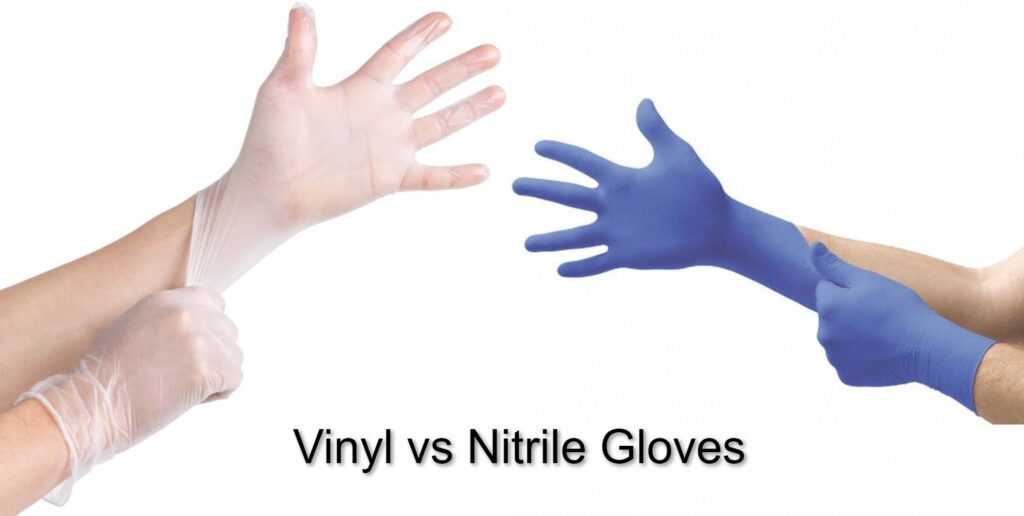Gloves are very important for day to work, be it low-risk jobs or high-risk jobs!
But, when the question is of safety, it’s important to know which is the best for your protection.
While nitrile and vinyl gloves both works great in providing safety to the hands, there are particular jobs and needs which each of them meets and this article will help you find it out by comparing both the gloves in different parameters.
Nitrile gloves are the best choice for high-risk jobs which demand handling of chemicals, resistance to cuts, punctures, heat, wear and tear, abrasion and also best in durability. While vinyl gloves will also provide safety from all of the mentioned hazards, yet when compared to nitrile gloves, they might not be able to offer the same performance.

I know this is not enough information for you to understand the main differences between the two types of gloves, but now when you know that nitrile gloves are better for high-risk jobs, let’s find out why?
Comparison of nitrile and vinyl gloves
| Parameters | Nitrile gloves | Vinyl gloves |
| Made from | Synthetic rubber known as acrylonitrile-butadiene rubber | Synthetic polymers (blend of synthetic rubber, PVC and plasticizers) |
| Used for | Food industry, health-care, chemical handling, labs, beauty factories, etc. | Food industry, manufacturing industries, health-care, clean-ups |
| Resistance to abrasion | More | Moderate |
| Resistance to heat | More | Less |
| Resistance to wear and tear | More | Less |
| Resistance to cuts | More | Less |
| Resistance to puncture | More | Moderate |
| Resistance to garden chemicals | Good | Good |
| Resistance to automotive chemicals | More | Moderate |
| Resistance to painting and refinishing chemicals | More | Moderate |
| Resistance to household chemicals | Good | Good |
| Flexibility | More | Less |
| Durability | More | Less |
| Risk-handling | More | Less |
| Price | More | Less |
Pros and cons of nitrile and vinyl gloves
Nitrile gloves:
Pros of nitrile gloves:
-
-
- Nitrile gloves are better in durability when compared to vinyl gloves
- They are flexible and more comfortable to wear
- They get molded to the shape of your hands thus offering a perfect fit
- Nitrile gloves are resistant to cut, abrasion, tear and puncture
- They are also resistant to most of the chemicals used in the household or in the food or health industry
- They are light in weight and also breathable
- They are resistant to heat which makes them perfect for use in jobs which involves dealing with flames and heat
- They are also resistant to oils and fats
- The best thing is that they are resistant to allergens
-
Cons of nitrile gloves:
-
-
- They are a bit on the costlier side
- They are not disposable but for long term use which might be a con for the health professionals
-
Vinyl gloves:
Pros of vinyl gloves:
-
-
- Vinyl gloves are light in weight and can be disposed of after use
- They have a coating of slightly powdered materials which makes them easy to slide on in the hands
- They are cost effective as compared to the nitrile gloves
- They are waterproof
- They are also resistant to oils and fats
- They are resistant to chemicals to some extent
- They are anti-static in nature which means there will be no charge build up inside the gloves due to friction with the hands
- They do not give any allergic reactions
-
Cons of vinyl gloves:
-
-
- The flexibility and elasticity of vinyl gloves are less as compared to the nitrile gloves, making them less comfortable to wear
- They are less resistant to harsh chemicals
- They are not heat resistant to a great extent
- They are also less durable as they do not offer much resistance to cuts and punctures
- Too much stretching of vinyl gloves destroys the protective coating on them
-
Which gloves to use when?
When to use nitrile gloves?
You should use nitrile gloves when you want to perform high-risk jobs like cutting, drilling, while handling harsh chemicals in food, health or any heavy-duty jobs.
Nitrile gloves are also the best choice for handling oils as they are resistant to oils and will provide you good grip even when they come in contact with oils.
Resistance to heat is yet another advantage of nitrile gloves, for which you can use them while working with heat.
Lastly, if you want a glove that is durable and will provide you a comfortable fit and wear you should choose nitrile gloves as they have a good shell life and are made of breathable materials to keep your hands dry while you work.
When to use vinyl gloves?
If you want a glove for short-term use and for doing light works which do not involve handling of any harmful chemicals and also do not pose any dangers of cuts and heat, you should choose vinyl gloves and dispose them off after single-use.
Is nitrile safe on skin?
Yes, nitrile gloves are absolutely safe on the skin as they do not cause any allergic reactions and also offer breathability to the hands for a comfortable wear.
When should you not use vinyl gloves?
You should not use vinyl gloves when you need high resistance to chemicals, heat and cuts. That said, you should not use vinyl gloves for any heavy-duty jobs. They are just suitable for low-risk jobs only.
Are vinyl gloves waterproof?
Yes, one positive thing about vinyl gloves, besides being cost effective is that they are waterproof. So, dip your hands in water while wearing vinyl gloves and they will remain absolutely dry.
And it’s a wrap!
So, which is better nitrile or vinyl gloves?
Now this is a question you need to ask yourself that what do you actually need!
If you need flexibility, durability and resistance to extreme conditions like harmful chemicals and heat, nitrile gloves should be your best choice.
I repeat, the main thing about nitrile gloves is their high resistance to chemicals which makes them the first choice by health professionals.
If you need a glove for your house clean-ups, beauty shops, dispensary, where there is no major threat from any kind of hazards, it is best to choose vinyl gloves.
I hope you got your answer through this article!
Continue to explore more of our articles for such valuable insights into work wears and I will take your leave from this page for now with the hope to see you soon in my next post!







